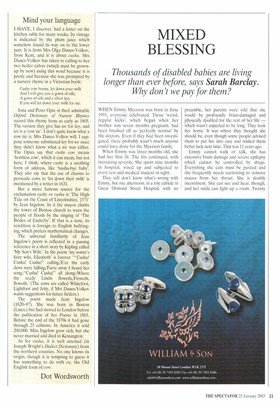Mind your language
I HAVE, I discover, had a letter on the kitchen table for many weeks. Its vintage is indicated by the plum juice which somehow found its way on to the lower part. It is from Mrs Olga Danes-Volkov, from Kent, and it is about cusha. Mrs Danes-Volkov has taken to calling to her two heifer calves (which must be grownup by now) using this word because it is pretty and because she was prompted by a nursery rhyme in a Victorian book:
Cushy cow bonny, let down your milk And I will give you a gown of silk; A gown of silk and a silver key If you will let down your milk for me.
Iona and Peter Opie in their admirable arford Dictionary of Nurseiy Rhymes record this rhyme from as early as 1805. The version they give has tee for key, and tee is a 'cow tie'. I don't quite know what a cow tie is; Mrs Danes-Volkov will. I suppose someone substituted key for tee since they didn't know what a tee was either. The Opies say that cushy cow means 'hornless cow', which it can mean, but not here, I think, where cushy is a soothing form of address, like shusha-bye baby'. They also say that the use of charms to persuade cows to let down their milk' is mentioned by a writer in 1631.
But a more famous source for the exclamation cushy or cusha is 'The High Tide on the Coast of Lincolnshire, 1571' by Jean Ingelow. In it the mayor climbs the tower of Boston church to warn the people of floods by the ringing of 'The Brides of Enderby'. If that is a tune, its rendition is foreign to English bellringing, which prefers mathematical changes.
The universal familiarity of Jean Ingelow's poem is reflected in a passing reference in a short story by Kipling called 'My Son's Wife'. In the poem 'my sonne's faire wife, Elizabeth' is forever '"Cusha! Cusha! Cusha!" calling,/E'er the early dews were falling,/Farre away I heard her song./"Cusha! Cusha!" all along;/Where the reedy Lindis flowethRloweth, floweth.' (The cows are called Whitefoot, Lightfoot and Jetty, if Mrs Danes-Volkov wants suggestions for future heifers.)
The poem made Jean Ingelow (1820-97). She was born in Boston (Lincs.) but had moved to London before the publication of her Poems in 1863. Before the end of the 1870s it had gone through 23 editions. In America it sold 200,000. Miss Ingelow grew rich, but she never married and died in Kensington.
As for cusha, it is well attested (in Joseph Wright's Dialect Dictionary) from the northern counties. No one knows its origin, though it is tempting to guess it has something to do with cu, the Old English form of cow.
Dot Wordsworth


















































































 Previous page
Previous page